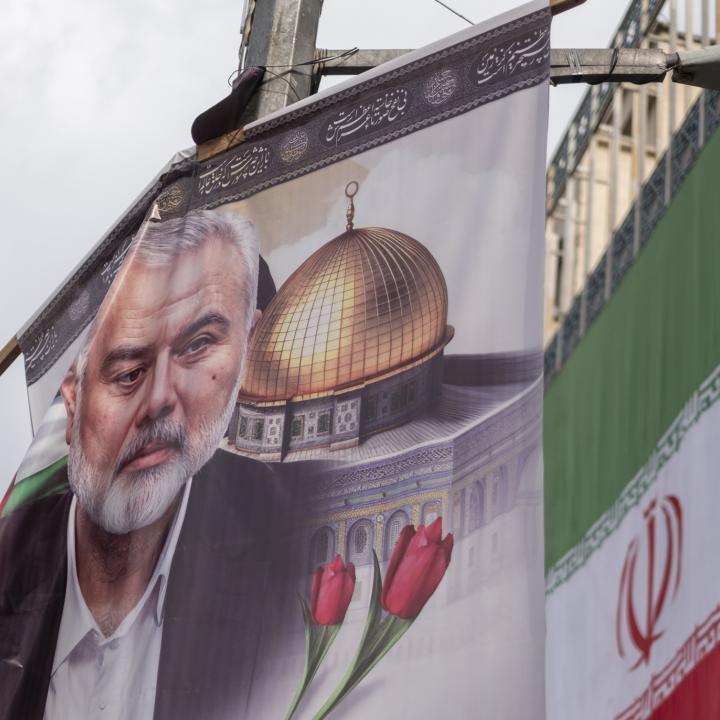
- Policy Analysis
- PolicyWatch 3906
Will Two Attacks Kill the Gaza Talks and Iran-Hezbollah Deterrence?

Four Washington Institute experts assess Israel’s calculus behind launching such high-profile attacks at this juncture, the likely effects on the Gaza hostage talks, Iran’s possible need for a face-saving military response, and more.
At first glance, the only common thread between the two targeted killings that rocked the Middle East this week—senior Hezbollah commander Fuad Shukr in a July 30 Israeli strike in Beirut, and Hamas Political Bureau chief Ismail Haniyeh in an as-yet-unclaimed attack in Tehran hours later—is that both men were top members of Iran’s self-styled “axis of resistance.” The strike on Shukr is easier to explain: Israel held him responsible for a July 27 rocket attack that killed twelve children in Majdal Shams. Yet while that attack crossed multiple red lines, Israel still did not want to trigger an all-out war with Hezbollah—hence its preference for a targeted strike that imposed a visible price (hitting a top commander in the heart of Beirut) while avoiding a large-scale operation and heavy civilian casualties. This approach leaves the question of “what next?” to Hezbollah, even as it demonstrates that Israel still has superior intelligence on the group and its movements.
The killing of Haniyeh was more surprising—in part because he was reportedly Qatar’s main interlocutor in the ongoing talks to free hostages captured on October 7, and also because he was in Iran at the time. Israel has not acknowledged that it carried out the attack in downtown Tehran (reportedly using a bomb planted weeks ago), but the nature of the operation and identity of the target point in its direction. Killing him there is profoundly humiliating for Iran—Haniyeh had met with Supreme Leader Ali Khamenei earlier that day and was in town for the inauguration of President Masoud Pezeshkian. The embarrassing optics will put major pressure on the regime to retaliate in some fashion.
Put simply, the killing of Shukr is understandable and easy to justify for anyone familiar with his operational background and Israel’s long-running campaign against similar Hezbollah figures, while killing Haniyeh seems more inscrutable at first glance. True, holding all Hamas leaders accountable for the atrocities of October 7 may reflect a general conviction among Israelis. Yet Haniyeh traveled a great deal, providing numerous opportunities to target him—why now, and why in Tehran?
The answer probably lies in Israel’s desire to reestablish the image of what it can do to its enemies. Ten months of war in Gaza has eroded this image of Israeli military power in the Middle East. By killing two top figures in such close proximity, in two high-profile locations, and using unmistakable military and intelligence capabilities that no one else in the region possesses, Israel may have hoped to reassert its strength in dramatic fashion. According to this line of thinking, Iran, Hezbollah, and Hamas needed to know that Israel can and will kill anyone who directly threatens its citizens or authorizes attacks on them, with the overarching message that no person or place is beyond its reach. The practical aim of such an approach is to make deterrence a personal matter—that is, letting individual commanders and other senior figures know that they are putting their lives in direct danger simply by planning or approving attacks on Israelis.
Calculating Iran’s Calculus?
Regardless of Israel’s desire to reestablish deterrence, leaders in Jerusalem and Washington must still think through how Iran and Hezbollah are most likely to respond. Yes, this week’s targeted killings could make both of them think more carefully about how they act on Tehran’s longstanding call to create a “ring of fire” around Israel. Yet even if they decide to become more careful in the long term, they will still likely hit back in the near term, greatly raising the risk of further miscalculation.
For Iran, Haniyeh’s killing requires a significant answer because it took place in Tehran, implying that the regime cannot protect its guests and “axis” allies. For Hezbollah, Shukr’s killing is less a matter of humiliation than a reminder of its critical vulnerabilities. Like Iran, it will be looking intently for leaks and spies in its intelligence and security apparatus in the coming days. Yet it will also want to impose a price on Israel sooner rather than later. Neither Tehran nor its top proxy seem to want a war with Israel, but they also need to avoid looking weak.
As for what type of retaliation they might launch, they do not have the capability to carry out matching precision attacks on senior Israeli figures. Yet they can assault Israel with barrages of missiles and rockets. Iran will likely orchestrate simultaneous barrages from Hezbollah, the Houthis in Yemen, and its militia proxies in Iraq, hoping that some munitions will get through—or, at the very least, that Israel’s air defense stockpiles will be depleted. Moreover, after Iran’s direct attack against Israel on April 13 failed to deter attacks inside Iran, the regime may decide to once again carry out strikes from its territory. The April attack involved a single round of ballistic and cruise missile strikes, so Tehran will likely consider multiple rounds this time to demonstrate that it is moving up the escalation ladder.
The point here is that Israel and its allies need to think through the full range of options that Iran may consider. In all likelihood, Tehran will push Hezbollah to attack a fuller array of targets in Israel than it might have if only Shukr had been killed. And this time, the axis may try to demonstrate a more effective level of coordination and cooperation.
Whither Gaza Ceasefire Talks?
On the diplomatic front, Tehran will likely ask Hamas to stop all movement toward a hostage and ceasefire deal in order to avoid giving the impression that Israeli strikes and military pressure worked. This does not mean the deal will never come to fruition, but a delay is almost certain.
In Israel, the apparent decision to kill Haniyeh greatly reduces the chances that Prime Minister Binyamin Netanyahu will compromise on his terms for a hostage deal, especially now that Hamas is likely to harden its terms. In recent weeks, two competing theories have emerged about how he is approaching the hostage issue. One theory is that he will become more flexible now that the Knesset has entered a three-month recess and he is temporarily safe from a parliamentary vote of no confidence led by far-right members of his coalition, who oppose any compromise with Hamas.
The second theory holds that his uncompromising stance is more than just rhetoric—that he truly will not accept a deal until Hamas is sufficiently weakened militarily. According to this line of thinking, he is dead set on retaining physical control of two corridors in Gaza that he deems central to preventing Hamas from reconstituting itself or launching future rocket barrages against Israel: the Netzarim Corridor in the northern part of the Strip and the Philadelphia Corridor along the Egyptian border.
The Haniyeh attack would seem to bolster the theory that Netanyahu will not compromise his terms for a hostage deal—even though these terms have been firmly rejected by the top Hamas leader on the ground, Yahya al-Sinwar. Indeed, Netanyahu gave no indication that he was willing to compromise when he met with President Biden in Washington last week. Rather than using the Knesset recess as an opportunity for tough compromises, signs have emerged that he may authorize more strikes on senior Hamas figures. (Notably, Israel’s past efforts to stamp out the group by targeting its leaders have repeatedly failed to achieve that goal, as seen in the long-ago killings of Hamas founder Ahmed Yassin, his replacement Abdul Aziz Rantisi, and military commander Ahmed Jabari.)
Within the broader Hamas leadership, it is unclear whether Haniyeh’s death will halt or simply delay contacts with Israel on the hostage issue. He was a key factor in those negotiations given his ties to Qatar, but another Hamas figure can be expected to fill his shoes at some point (though each of the likeliest candidates comes with caveats—Khaled Mashal would face opposition from Iran, who wants a more hardline figure, while Mousa Abu Marzouk lacks support among the Hamas rank and file). This year’s previous killings of other Hamas leaders such as Marwan Issa, Muhammad Deif, and Saleh al-Arouri did not prevent talks from proceeding; it remains to be seen if that will be the case after Haniyeh. At the very least, the transition will be hindered by the logistical challenge of convening the Political Bureau in wartime to choose a permanent successor.
Regarding Hamas’s military calculations, Sinwar deputy Khalil al-Haya appeared at a press conference in Tehran after Haniyeh’s death and stated, “Hamas and Iran are not interested in a regional war, but nevertheless the killing of Haniyeh is a crime that must be punished.” This statement contradicts the original goal laid out by Hamas and Sinwar after October 7, namely, to drag Israel into a multifront regional war. Haya probably chose that wording to appease his hosts in Tehran.
Elsewhere in the Palestinian arena, marches were quickly held in the West Bank and East Jerusalem upon news of Haniyeh’s death, calling on residents to support Hamas and unify against Israel. A few hours after he was killed, Hamas claimed responsibility for a shooting and stabbing attack near the Jewish settlement of Kiryat Arba, describing it as a response to the Tehran attack. Yet a wider uprising remains unlikely. Palestinian Authority chairman Mahmoud Abbas likewise condemned Haniyeh’s killing, though he privately views Hamas as a threat and has long welcomed any development that weakens the group.
Effect on U.S. Interests?
As for how this week’s targeted killings might affect the bilateral relationship with Washington, Israel may have sought to convey that it will not be held back by the United States. If so, this message was intended not as a show of defiance toward its closest ally, but rather as another way of reestablishing deterrence with Iran and Hezbollah. Perhaps such an assertive, surprising approach can work in the long term, but neither Netanyahu nor President Biden should have any illusions about what Iran and Hezbollah may do in the near term.
In the coming days, the Biden administration will understandably be focused on preventing the conflict from escalating. Ironically, however, Iran’s fear of drawing America into the fight is the best lever for tempering what the regime decides to do next, so the administration should use this fear to its advantage. The current spike in Iranian rhetoric against the United States may be a sign that Tehran wants to indirectly deter Israel from forcefully responding to any axis retaliation by increasing the risk of wider escalation. With that in mind—and having made its point—Israel should now take American interests and concerns into account.
Dennis Ross is the counselor and William Davidson Distinguished Fellow at The Washington Institute. David Makovsky is the Institute’s Ziegler Distinguished Fellow and director of its Koret Project on Arab-Israel Relations. Neomi Neumann is a visiting fellow at the Institute and former head of the research unit at the Israel Security Agency. Farzin Nadimi is a senior fellow with the Institute.





